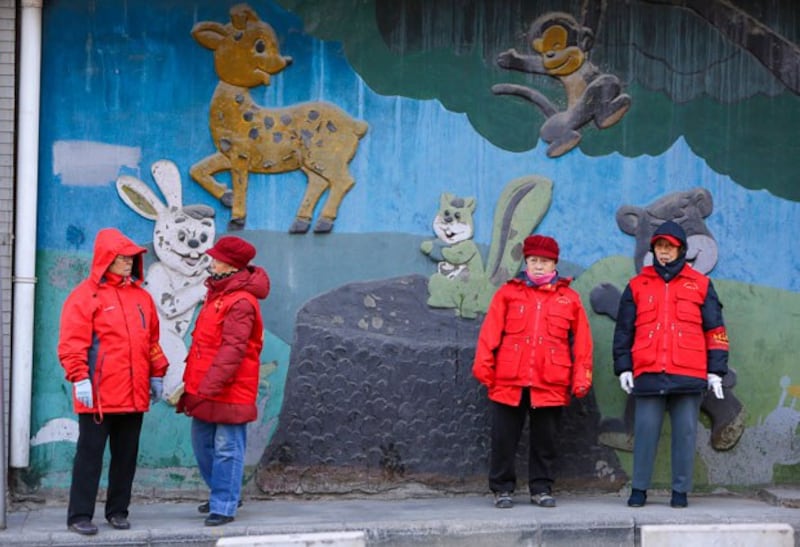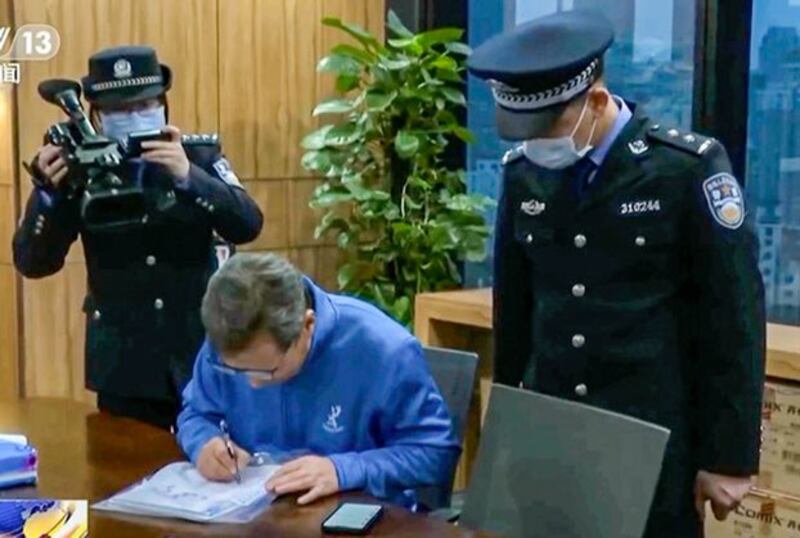China's top spy agency is cranking up its propaganda campaign warning of foreign "spies" to mark National Security Education Day, in a bid to get more people to inform on each other and steer clear of anything linked to the West, analysts said this week.
Introduced by Chinese President Xi Jinping in 2015, National Security Education Day is observed every April 15 to raise public awareness about safeguarding China’s national security, a core interest of the government.
The feared Ministry of State Security released a video detailing its "top 10" list of major espionage cases and a list of cases based on tip-offs from members of the public, including the "hostile foreign forces" that Beijing claims are behind the pro-democracy movement in Hong Kong, and calling for greater public awareness of foreign "espionage" activities.
Part of the video features a Chinese-American shown to confess to allegedly being recruited as a spy by U.S. intelligence, who appealed to his sense of patriotism and “fooled” him into betrayal.
The man, surnamed Liang, goes on to say he regretted it greatly and warns readers: “I want to tell all Chinese people: Their (American) sweet words are fake.”
The man is in his 70s and is said in the video to have been sentenced to life in prison in China in 2023.
Elastic definitions
The Chinese authorities have typically employed a highly elastic definition of what constitutes a state secret, and national security charges are frequently leveled at journalists, rights lawyers and activists, often based on material they post online.
"Comprehensive measures are needed in terms of raising awareness of safeguarding national security," the ministry, which included a top 10 list of public tip-offs, as well as details of "awards" handed out to people who made "significant contributions."
The video warned that university teachers and students were targets for foreign infiltration, mirroring international allegations about China's activities on overseas campuses.

Beijing also promoted National Security Education Day education in far-western Tibet and Uyghur-populated Xinjiang, where authorities impose particularly heavy-handed control to suppress what Beijing says are growing separatist — and in the case of Xinjiang, terrorist — threats.
Chinese nationals abroad were also warned to be vigilant.
"Through various means such as emotional solicitation, seduction and corruption, financial purchase and offering help, overseas spies have tried every means to recruit and instigate Chinese officials, researchers and Chinese personnel working overseas, posing a serious threat to China's national security," the film warned.
Claims of foreign espionage
Amendments to the Counter-Espionage Law in April 2023 further broadened the scope of material that can be used to back up allegations of spying, including the kind of data that could be gathered for market analysis.
They also give authorities new powers to access corporate facilities and electronic equipment, which have already been used to target foreign consultancies.
Feng Chongyi, a professor at the University of Technology in Sydney, said claims of foreign espionage are there to help shore up Communist Party leader Xi Jinping's grip on power.
"They want to keep eyes on everyone, everywhere, and watch everyone," Feng said. "They feel they don't have enough people to do this, despite already having around four million police officers, which is quite a lot."
"So, they need to mobilize the masses and give them the right to enforce the law and do the authorities' dirty work for them," he said. "That means people informing on each other, setting people against each other, and everyone watching everyone else."
In January, police arrested the head of a foreign consultancy firm as an alleged British spy, with one newspaper warning that there are "007s" everywhere in real life — a reference to the fictional British secret agent James Bond whose code name is 007.
The ministry list features Canadian nationals Michael Spavor and Michael Kovrig, along with Belizean national Henley Lee, who was accused of funding the 2014 Occupy Central pro-democracy movement in Hong Kong, also known as the Umbrella Movement.
Lee was paraded on state TV in a heavily stage-managed confession in 2021 and accused of "funding hostile elements in the U.S., colluding with foreign anti-China forces to intervene in Hong Kong affairs, and funding the implementation of criminal activities that endangered our national security," in connection with the 2014 Hong Kong protests.
Spavor and Kovrig were among eight Canadian nationals detained in China within weeks of the arrest of Huawei executive Meng Wanzhou in Vancouver in December 2018. All three were released almost simultaneously after Meng made a deal with U.S. investigators over allegations that she broke U.S. sanctions, ending her house arrest.
The party’s grip on power
Veteran journalist and political commentator Hu Ping said the "national security" campaign is a political tool that will help ensure the stability of the regime.
"What they are doing is trying to get everyone to inform on each other," Hu said. "It claims to be about national security, but actually it puts the interests of the Communist Party's grip on power above everything else."
Hu warned that such an approach will cause "widespread panic" and put a huge strain on interpersonal relationships.
"That atmosphere is entirely conducive to the authorities' control over the people ... and could lead to a large number of false claims and miscarriages of justice," he said.

Veteran journalist Tang Jingyuan said the ministry's lists were carefully curated to give the impression that anything that has to do with the West is suspicious.
"It replicates the tactics of class struggle from the Mao era," Tang said in a reference to Mao Zedong, influential Chinese leader and founder of the People's Republic of China, whose revolutionary ideology shaped the country’s history from 1949 to 1976.
"The aim is to create an atmosphere that is anti-Western, or at least wary of the West ... and that keeps its distance from foreign countries," she said.
Hong Kong
Authorities in Hong Kong, which recently added a second national security law to its statute book, staged a series of lavish ceremonies to mark the day, which critics say has become a focal point for "brainwashing" of Hong Kongers by the ruling Chinese Communist Party amid an ongoing crackdown on public dissent.
Beijing's envoy to Hong Kong, Central Liaison Office director Zheng Yanxiong warned that the government would fight back, using "tit-for-tat cognitive warfare" against critics of the Safeguarding National Security Law, which extended an ongoing crackdown on dissent and political opposition in the city begun in the wake of the 2019 protest movement.
"Some ill-intentioned foreign forces have been bad-mouthing China and Hong Kong ... and even some renowned Western media have jumped on the bandwagon, slandering and smearing," Zheng said, in a reference to criticism of the new law, known as Article 23, in the media.
Current affairs commentator Sang Pu said Beijing is continuing to claim that Hong Kong is a "base" from which "foreign forces" will try to infiltrate the rest of China, despite the fact that the majority of opposition politicians and activists are either behind bars or overseas now.
"It's all a kind of packaging, and is definitely not factual," Sang said of the claim. "They claim that large amounts of money have poured into Hong Kong since June 2019, but it's all fake news."
"They want to shift everyone's focus from the tyranny, incompetence and corruption of the Chinese Communist Party and the Hong Kong government to 'infiltration by foreign forces,'" he said.
Tibet
In monasteries, schools, and villages in Lhasa, capital of the Tibet Autonomous Region, authorities emphasized the need to protect state secrets, promptly report any activities threatening national security, and defend the country and resist aggression.
Authorities also stressed the ban on communication with the exiled Tibetan spiritual leader, the Dalai Lama, and the exiled Tibetan community, considered by China as “separatist groups,” and on restricting the sharing of domestic information with the outside world,a source inside Tibet told Radio Free Asia.
Experts on the region said the measures were initiated without any legal basis and were intended as a suppression tool to be used against Tibetans and other ethnic minorities.

“The Chinese government asserts that national security education strengthens the totalitarian power of the Chinese Communist Party,” said Dawa Tsering, director of the Tibet Policy Research Institute in Dharmasala, India. “In the interests of the party, Tibetans are often accused of national security violations and breaking the law.”
China's National Security Education Day initiatives include official interpretations and terminologies, such as “state power, ruling power of the state, unitary sovereignty and complete territorial integrity,” but in Tibet, they primarily refer to banning contact with the Dalai Lama, he said.
Every year, there are reports of Tibetans who have been arrested, arbitrarily detained, disappeared or sentenced for alleged involvement in national security violations in Tibet.
The arrests and sentencing of Tibetans for such alleged crimes underscore Beijing’s continuing drive to destroy the influence of men and women whose views of life in Tibetan regions of China go against official Chinese narratives.
Xinjiang
In Xinjiang, to the north of Tibet, officials are broadcasting a national security education public course for 10 days, according to an April 14 statement on the website of the Department of Justice of the Xinjiang Uyghur Autonomous Region.
“Through a variety of online and offline propaganda and education activities, we will further promote the overall national security concept to be deeply rooted in the hearts of the people and build a common national security defense line,” the statement said.
Other activities were held in specific areas of the vast region, home to more than 11 million Uyghurs.
National security themes were promoted on educational billboards and banners in the People’s Park in Ghulja, called Yining in Chinese, capital of the Ili Kazakh Autonomous Prefecture, beginning on April 7.
On the same day, authorities held a publicizing activity on the laws and regulations on overall national security and border security was held in Tajik township of Pishan county in Hotan prefecture.
The Hongmiaozi police station under Shaibak district's Bureau of Public Security in Urumqi, Xinjiang's capital, held a public lecture on China’s Cybersecurity Law and Anti-Espionage Law in many communities on April 13.
On the same day, the Public Security Bureau in Akesu prefecture held a police camp where children learned about security awareness to improve their ability to recognize acts that endanger national security.
Translated by Luisetta Mudie and by Tenzin Palmo for RFA Tibetan . Edited by Roseanne Gerin and Malcolm Foster.

